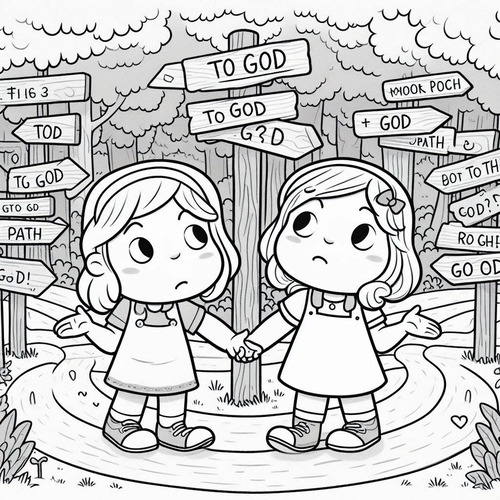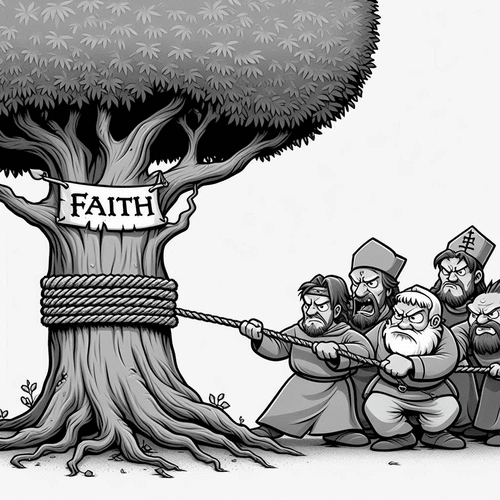Christianity’s Exclusive Claims: Addressing Hindu Objections
Presenting the Unique and Winsome Christ
Overview: The Hindu and Buddhist faiths have historically objected to Christianity’s exclusive claims: it’s teaching that Jesus Christ is the only way to eternal salvation. These faiths see this as a narrow claim. This article presents a reasoned Christian perspective.
Christ’s Divinity and Universal Implications Dharmic faiths emphasize enlightenment, karma and reincarnation, at their core, while Christianity teaches Jesus Christ is not merely an enlightened teacher, but the eternal Son of God who took on human form (John 1:1, 1:14). As God incarnate, His identity and redemptive work have inescapable universal implications. Christianity’s exclusive claims about Jesus being the Way, the Truth and the Life, and that no one comes to the Father except through Him (John 14:6) must be either true or false for all people.
A Unique Saviour for a Universal Predicament Rather than offering just another philosophical system, Christianity diagnoses humanity’s core issue as our separation from a holy God due to sin (Romans 3:23). In His great love, God took on human form in Christ to provide the solution—His sacrificial death and resurrection makes possible humanity’s reconciliation to God (2 Corinthians 5:19). Salvation is thereby received as a free gift by grace, not earned through accumulating merit over many lifetimes.
Historical Corroboration of Christ’s Resurrection Crucially, Christianity is anchored in the historical reality of Christ’s resurrection from death, attested by over 500 eyewitnesses (1 Corinthians 15:3-8) and evidenced by the transformational impact on Christ’s early followers. This was no mere spiritual metaphor, or an afterthought in the Biblical narrative, but a space-time event upon which scriptural truths rest (1 Corinthians 15:17). All Christian doctrines derive from this pivotal resurrection event.
A Universal Truth Amid Pluralism While Dharmic religions promote pluralistic paths to enlightenment, the core Christian belief is that there is one objective spiritual truth about our separation from God which necessitates a solution only Christ provides. His sacrificial, substitutionary death for sin is an act of divine grace freely offered but not earned. Jesus doesn’t claim to be one of many enlightened guides, but the way humanity can be restored to God.
A Gentle Reminder on Religious Exclusivity To those who object to Christianity on the basis that it makes exclusive claims about being the sole path to salvation, it’s important to understand this critique actually applies to all major world religions. When the law of non-contradiction is applied to the truth claims of the different faiths, one realizes they cannot all be equally true across the board. Why? Because all religions make mutually exclusive and contradictory assertions about essential spiritual matters—including the nature of God and the means of attaining enlightenment, liberation or heaven.
For instance, Christianity’s core beliefs about there being one eternal God, about human sin separating us from God, and about the necessity of God’s Son dying for our redemption stand in stark contrast to the teachings of other faiths. Hinduism’s beliefs about the enduring cycle of reincarnation until moksha, Buddhism’s path to nirvana through enlightenment, and Islam’s conception of rigid monotheism all directly contradict Christianity’s central tenets. Thoughtful adherents of these traditions recognize the difficulty of full religious pluralism and universal truth synthesis.
When one applies the law of non-contradiction, a few scenarios emerge: Either one of these religions is completely true and the fundamental contradictory claims of others are false, or they are all false representations of ultimate spiritual reality. No honest seeker can escape having to grapple with these options. An attitude of maximal openness requires recognizing the intrinsic exclusivity within each religion’s framework of truth claims.
Ultimately, while Christians believe Christ is the only way to salvation, this represents not arrogance but a sincere conviction flowing from the radical claims and Person of Jesus Himself—and these are claims that we believe scrutiny.
References: Stott, J. (2012). Basic Christianity. Eerdmans. : Lewis, C. S. (1952). Mere Christianity. HarperOne. : Packer, J. (1973). Knowing God. InterVarsity Press.
Related Reads
Editor's Pick

No Decay, No Defeat: What It Means That Christ’s Body Saw No Corruption
On the Day of Pentecost, Peter stood before thousands and made a startling claim: David's body decayed in the tomb, [...]

GPS Without Eyes: How Ants Silently Shout Intelligent Design
Picture a leafcutter ant navigating the rainforest floor in pitch darkness, carrying a leaf fragment 50 times its body weight. [...]

Does God Truly Care About My Everyday Choices?
We believe God created the universe. We believe He orchestrated the exodus from Egypt and raised Jesus from the dead. [...]
SUPPORT US:
Feel the Holy Spirit's gentle nudge to partner with us?
Donate Online:
Account Name: TRUTHS TO DIE FOR FOUNDATION
Account Number: 10243565459
Bank IFSC: IDFB0043391
Bank Name: IDFC FIRST BANK






